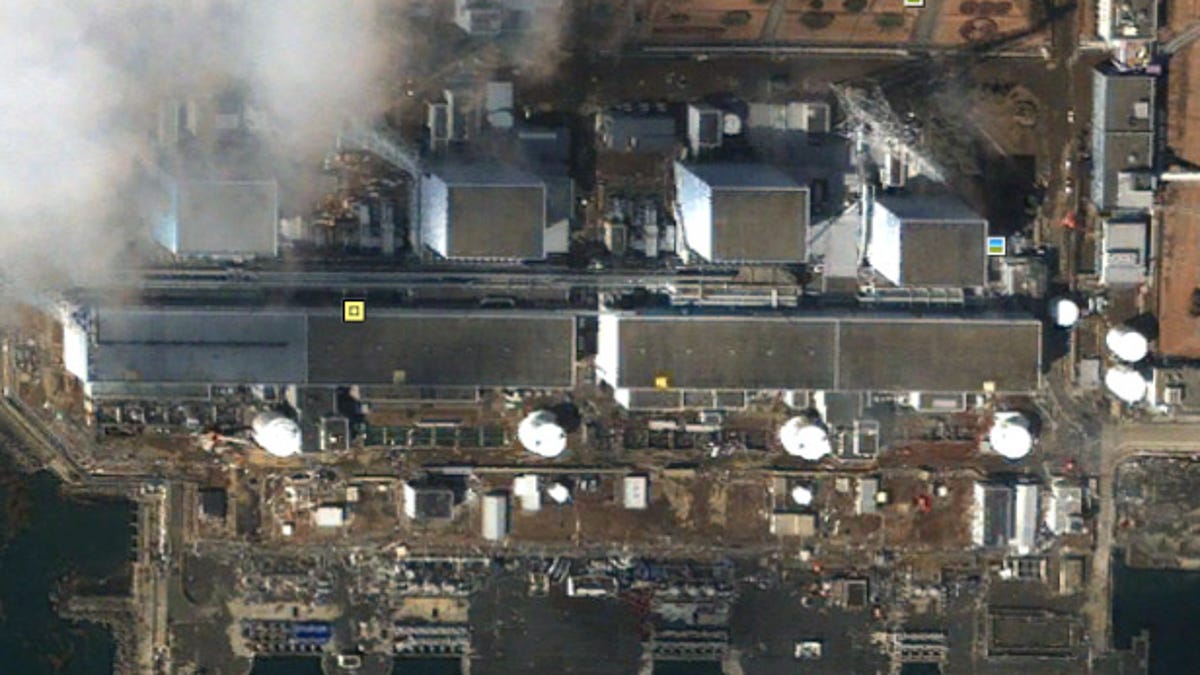Japan issues radiation warning after 3rd explosion
In a dramatic escalation of Japan's nuclear crisis, officials warn of elevated radiation levels after an explosion and fire inside reactors at earthquake-damaged Fukushima Daiichi nuclear power plant.

Four of the Fukushima Daiichi plant's six reactors are shown in this satellite photo from Geoeye via Google Earth. The reactors are the four tall buildings inland of the four longer buildings; the Pacific Ocean to the east is on the bottom of this photo.
In a dramatic escalation of Japan's nuclear crisis, officials warned of elevated radiation levels after another explosion and reactor fire rocked the earthquake-damaged Fukushima Daiichi nuclear power plant, the third explosion in four days.
In a nationally televised statement reported by the Associated Press and other news agencies, Japanese Prime Minister Naoto Kan said radiation has spread from four reactors at the plant.
"The level seems very high, and there is still a very high risk of more radiation coming out," Kan said. "We are making every effort to prevent the leak from spreading. I know that people are very worried, but I would like to ask you to act calmly."
Meanwhile, Chief Cabinet Secretary Yukio Edano said a fire at the plant's unit 4 reactor had released radioactive steam and urged anyone within a 30-kilometer (18.6-mile) radius to stay indoors.
"Now we are talking about levels that can damage human health," Edano said, according to local media reports. Radiation around one of the reactors was measured at 400,000 microsieverts per hour, about four times higher than the safe level, according to the AP.
"These are figures that potentially affect health, there is no mistake about that," Edano said.
The explosion inside the plant's unit 2 reactor occurred at 6 a.m. local time Tuesday, executives at the Tokyo Electric Power Co.--the plant's owner--reported at a news conference. Pressure readings indicated the reactor's containment vessel may have been damaged, and workers have been evacuated from the vicinity as a precaution, the company said.
The escalation comes a day after the buildup of hydrogen gas caused an explosion in the plant's unit 3 reactor, injuring six people, according to the International Atomic Energy Agency.
The regular power at the nuclear plant for the cooling system failed after the earthquake, at which time diesel generators kicked in for backup system. Less than an hour after the earthquake, though, the tsunami arrived and the generators failed. Plant operators have been pumping seawater into the reactors to cool them.
If the fuel rods inside the reactors get too hot, for example, if they can't be kept immersed or when the cooling system fails, the uranium can melt, causing a meltdown. The extreme heat also can produce dangerous amounts of gas that must be vented into the air to prevent an explosion.
Fukushima government spokesman Masato Abe told the media today that the fuel rods in unit 2 were briefly exposed but could not confirm whether they were ever totally exposed.
It was the latest in a series of serious problems triggered by Friday's earthquake and the resulting series of tsunamis that swept over Japan. The 185,000 residents living within 20 kilometers of the Fukushima Daiichi plant have been evacuated, piling another major problem on top of thousands of deaths, extensive property damage, rolling power blackouts, a run on food and water in Tokyo, and economic troubles.
The official death toll from last week's massive earthquake and tsunami has risen to 2,414, Japanese police said Tuesday. However, officials believe that tens of thousands may have been swept away by the tsunami that struck the northeastern coast of Japan on Friday.
Japan's benchmark Nikkei 225 stock index plummeted for the second day, shedding 847.97 points, or 8.8 percent, to 8,772.51 in midday trading Tuesday.
Updated at 9:42 p.m.: Added details on the radiation release and the fire.

